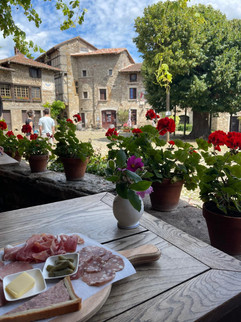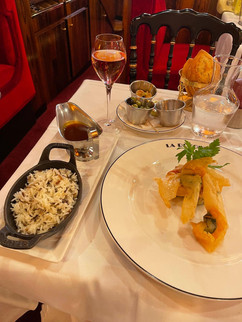Before you travel to France on your next holiday, it would definitely be helpful to have some basic French comprehension. Here is a collection of French words and phrases that you should know that will help you navigate this beautiful country.

France, or at least Paris, has a bit of a reputation when it comes to tourists and the French language.
Across social media, I’ve seen a lot of tourists complain that they were given a bit of a rude attitude because they didn’t know how to speak French, or even if they did and wanted to practice, a lot of French people would just speak back to them in English once they’d clocked onto the accent.
In my opinion, the French language can be particularly difficult because you have to remember the masculine and feminine of different nouns. Coming from an English speaking country, this took a long time for me to wrap my head around and I still get things wrong. I did have an unfortunate confrontation in a Parisian boulangerie because I accidentally misgendered a baguette. The woman behind the counter was quite harsh and said, “Non. It is not un baguette. It is une baguette,” and then rolled her eyes and asked for my money.
It can be daunting, facing people like this when you’re trying your hardest to speak a language that you’re not the most comfortable in. I felt so defeated after.
Of course, not everyone is like this. I had most of my bad interactions in Paris, while in the rest of France, everyone was lovely and patient, letting me try out my basic French and get some practice in. I had a great exchange with some shop owners in Avignon when I went to buy my brother a tie as a present.
I practiced my lines beforehand, knowing I wanted to go in and say that I didn’t speak French very well, but I wanted to see the red tie in the front window. They were over the moon that I was trying, and spoke back to me patiently in French. I am very pleased to say that not a word of English was spoken, and we talked about who the present was for, where I was from, and why I was in Avignon. I gave myself a big pat on the back after I left the store, tie in hand.

I believe it is always important, when traveling to a country where you don’t speak the language fluently, to go in knowing a few key words and phrases, so if you’re in a pinch and trying to speak with someone that doesn’t know your language, you can still try and have a conversation. Physically pointing at things is also a very useful technique that I use quite often.
With other languages, my Spanish is very limited and my German even more so, but I know how to say hello, goodbye, and thank you. I know my numbers 1-10 in Spanish, and 1 and 2 in German, and I can ask for a beer in both languages - which I have successfully done on many occasions! I also know a few phrases in Italian, Japanese, and Nepali.
Just having a couple basic words under your belt can be an absolute game changer. Below, I’ve compiled a collection of words and phrases that I think will be very helpful during your next trip to France. I would love to hear any of your stories about navigating a foreign country in another language too, both good and bad!
Basic Words and Phrases
Hello: “Bonjour”
Goodbye: “Au revoir”
How are you?: “Comment ça va?” (For more informal, you can just say, “Ça va?”)
Good morning: “Bonjour”
Good afternoon: “Bon après-midi”
Good evening: “Bonne soirée”
Good night: “Bonne nuit”
Please: “S'il vous plaît”
Thank you: “Merci”
Thank you very much: “Merci beaucoup”
Have a good day: “Bonne journée”
What is your name?: “Comment tu t'appelles?”
My name is: “Je m’appelle (your name)”
Yes: “Oui”
No: “Non”
Excuse me: “Excusez-moi”
I’m sorry: “Je suis désolé”
Where is the bathroom?: “Où sont les toilettes?”
Can you help me?: “Pouvez-vous m'aider?”
Do you speak English?: “Tu parles anglais?”
I don’t speak French: “Je ne parle pas français”
I don’t speak French very well: “Je ne parle pas français très bien”
I speak a little bit of French: “Je parle français un petit peu”
I don’t understand: “Je ne comprends pas”
Sir/Madam/Miss: Monsieur/Madame/Mademoiselle
Un/Une vs Le/La: Un/une are the masculine and feminine of ‘a’, while le/la are the masculine and feminine of ‘the’. Example: Une baguette (a baguette) vs la baguette (the baguette)
Numbers 1-10
Un
Deux
Trois
Quatre
Cinq
Six
Sept
Huit
Neuf
Dix
Ordering Food
One of these please: “Un de ceux-là s'il vous plaît”
Two of those please: “Deux d'entre eux s'il vous plaît”
How much is it?: “Combien ça coûte?”
I would like…: “Je voudrais…”
Can I have a menu please?: “Un menu s'il vous plaît?”
Can I have some water please?: “De l'eau, s'il vous plaît?”
Can I have the check please?: “L'addition, s'il vous plaît?”
Breakfast: Le petit déjeuner
Lunch: Le déjeuner
Dinner: Le dîner
Vegetarian/Vegan: Végétarien/Végétalien
Transportation
One ticket please: “Un billet s'il vous plaît”
Two tickets please: “Deux billets s'il vous plaît”
Where are the taxis?: “Où sont les taxis?”
Where is the…?: “Où est…?”
Where is track (#)…?: “Ou est la piste (#)?”
When is the next train?: “Quand part le prochain train?”
Which direction is…?: “Quelle direction est…?”
Train station: La gare
Bus station: La gare routière
Car: La voiture
Bicycle: Le vélo
Plane: L’avion
Subway: Le métro




























Kommentare